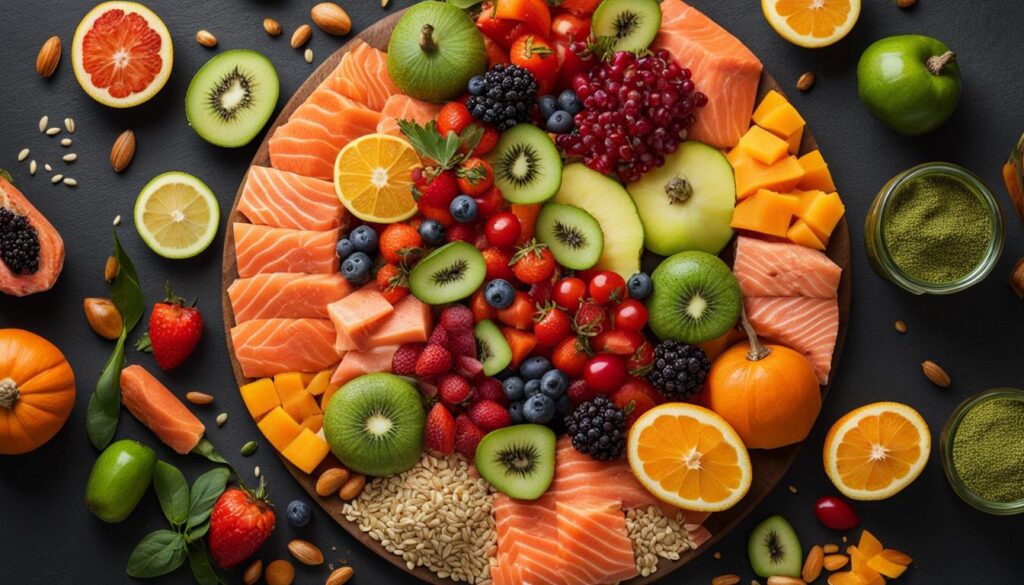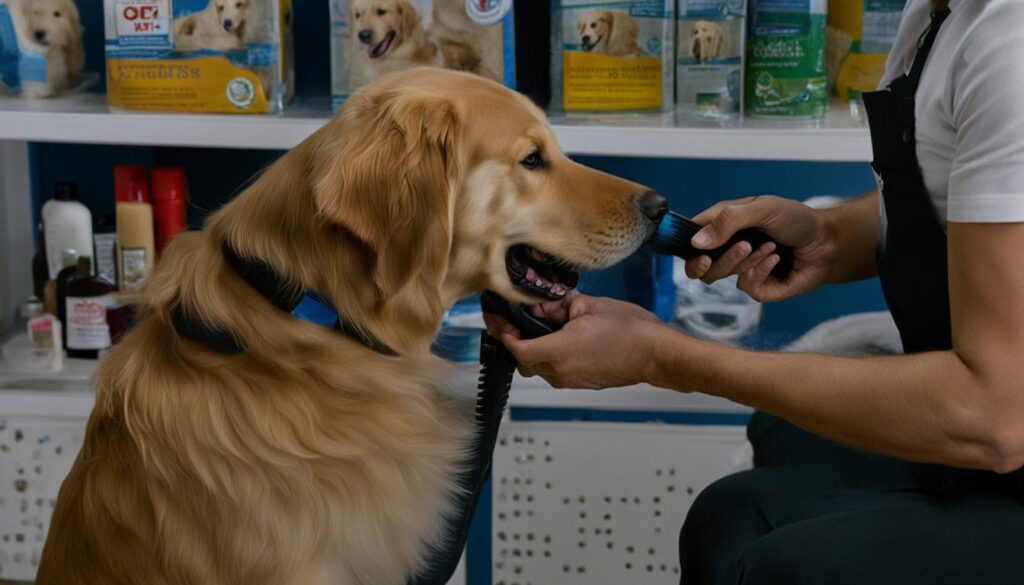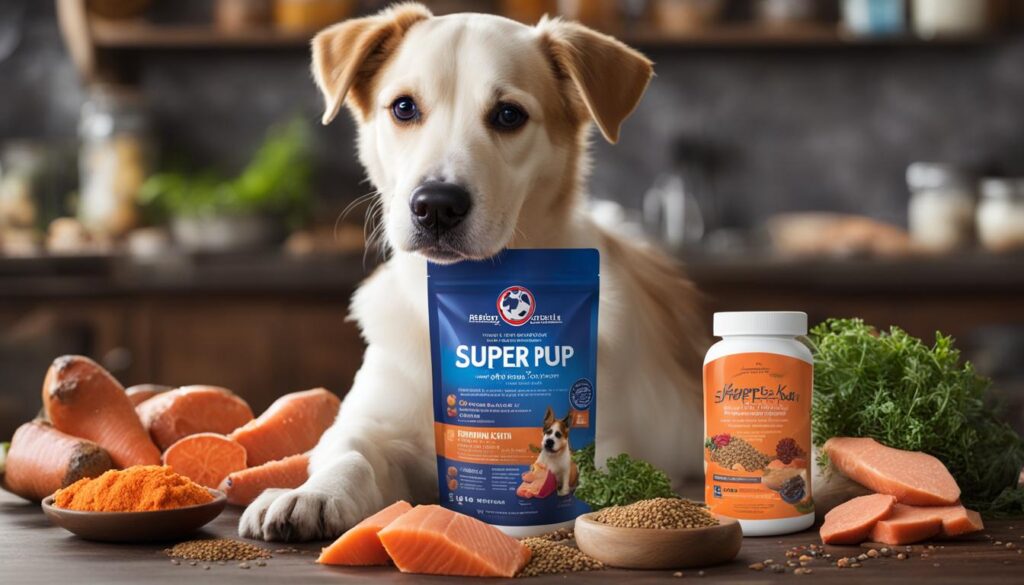The skin and coat of your dog are not just about appearance—they are important indicators of overall health. A lustrous coat signifies vitality and can reveal any underlying health issues. Did you know that the skin and coat are the largest organ in dogs, comprising around 10% to 15% of their total body weight?
Proper nutrition plays a crucial role in maintaining a healthy skin and coat in dogs. A diet rich in omega-3 fatty acids, protein, vitamins, and minerals is essential for their skin and coat health. Omega-3 fatty acids help protect the skin and coat and keep them shiny, while diets deficient in omega-6 fatty acid linoleic acid can result in dry, flaky skin. Zinc is important for skin health and reducing water loss, and biotin and B vitamins play important roles in maintaining healthy skin and fatty acid function.
So, what can you do to enhance your dog’s skin and coat health through nutrition? Let’s explore the role of diet, signs of skin and coat issues, the importance of grooming, protecting from environmental factors, and additional tips to keep your furry friend’s skin and coat healthy and vibrant.
Key Takeaways:
- A healthy skin and coat are important indicators of overall health in dogs.
- A diet rich in omega-3 fatty acids, protein, vitamins, and minerals is crucial for maintaining healthy skin and coat.
- Omega-3 fatty acids protect the skin and coat and keep them shiny, while deficiencies in omega-6 fatty acids can lead to dry, flaky skin.
- Zinc, biotin, and B vitamins play important roles in skin health and fatty acid function.
- Proper nutrition, grooming, and protection from environmental factors are key to keeping your dog’s skin and coat healthy and vibrant.
The Role of Diet in Skin and Coat Health
Proper nutrition is crucial in maintaining a healthy skin and coat in dogs. A balanced diet rich in essential nutrients can improve the overall health and appearance of your dog’s skin and coat. The following nutrients play a significant role in skin and coat health:
- Omega-3 and omega-6 fatty acids: These fatty acids are essential for maintaining a healthy coat and skin. They help reduce inflammation, promote a shiny coat, and prevent dryness and flakiness.
- Protein: Adequate protein intake is necessary for healthy hair growth and maintenance. It provides the building blocks for strong, lustrous fur.
- Vitamins: Certain vitamins, such as vitamin A, vitamin E, and biotin, are vital for skin health and the production of healthy hair. They contribute to the overall shine and texture of your dog’s coat.
- Minerals: Minerals like zinc and copper are essential for proper skin cell function and hair growth. They help maintain a healthy coat and prevent hair loss.
By ensuring your dog’s diet contains these essential nutrients, you can promote optimal skin and coat health. Additionally, natural supplements specially formulated to support skin and coat health, such as Super Pup, can be a beneficial addition to their diet.
Super Pup Skin and Coat Supplement
“Super Pup is a high-quality supplement specifically designed to promote a healthy skin and coat in dogs. It contains a blend of omega-3 and omega-6 fatty acids, vitamins, and minerals to support optimal skin health and enhance the shine and texture of your dog’s coat. The natural ingredients in Super Pup provide essential nutrients that may be lacking in your dog’s regular diet, ensuring they receive the necessary building blocks for a healthy coat. Give your furry friend the extra boost they need for a glossy coat and vibrant skin with Super Pup!”
Remember, before making any dietary changes or introducing supplements, it’s always important to consult with your veterinarian to determine the best approach for your dog’s specific needs. With the right nutrition and care, you can help your beloved pup achieve and maintain a healthy, shiny coat and radiant skin.
| Nutrient | Benefits | Sources |
|---|---|---|
| Omega-3 and omega-6 fatty acids | Promote a shiny coat, reduce inflammation, and prevent dryness | Fish oil, flaxseed, salmon, sardines |
| Protein | Supports healthy hair growth and maintenance | Lean meats, poultry, fish, eggs |
| Vitamins (A, E, biotin) | Essential for skin health and the production of healthy hair | Carrots, sweet potatoes, spinach, eggs |
| Minerals (zinc, copper) | Support proper skin cell function and hair growth | Beef, lamb, pumpkin seeds, lentils |

Signs of Skin and Coat Issues in Dogs
Your dog’s skin and coat are important indicators of their overall health. It’s essential to keep an eye out for signs that may indicate skin and coat issues. Monitoring these indicators can help you take prompt action and provide the necessary care your furry friend needs. Here are some common signs to look out for:
“A healthy coat should have a lustrous, shiny appearance.”
Dry, flaky skin is a common indicator of skin problems in dogs. If you notice your dog’s skin becoming dry and flaky, it could be a sign of an underlying issue that needs to be addressed. Excessive shedding, increased dandruff, thin hair, discolored hair, and poor healing are also signs that something may be amiss with your dog’s skin and coat.
Itchy skin, along with excessive scratching, licking, and biting, is another telltale sign of skin problems in dogs. If your dog is constantly scratching or trying to relieve their itchiness, it’s a clear indication that their skin needs attention. These symptoms could be related to dry skin, allergies, or even a parasitic infestation, such as fleas or ticks.
By being vigilant and recognizing these signs, you can take appropriate measures to address any skin and coat issues your dog may be experiencing. It’s important to consult with a veterinarian for an accurate diagnosis and the appropriate treatment for your dog’s specific needs.
| Healthy Coat Indicators in Dogs: |
|---|
| – Lustrous, shiny appearance |
| – Dry, flaky skin |
| – Excessive shedding |
| – Increased dandruff |
| – Thin hair |
| – Discolored hair |
| – Poor healing |
| – Itchy skin |
| – Excessive scratching, licking, and biting |
Grooming Tips for Healthy Skin and Coat
Grooming plays a vital role in maintaining a healthy skin and coat for your furry friend. By incorporating regular brushing, bathing, and other grooming practices into your dog’s routine, you can keep their skin moisturized and their coat shiny. Here are some essential grooming tips to promote healthy skin and coat:
Regular Brushing
Brushing your dog’s coat helps remove loose fur, tangles, and mats. It also stimulates blood circulation to the hair follicles, promoting a healthier, shinier coat. Additionally, regular brushing helps distribute the natural oils produced by the skin, keeping it moisturized and reducing the risk of dryness. Use a brush suitable for your dog’s coat type and gently work through the fur, paying attention to any problem areas or sensitive spots.
Bathing for Skin Health
Bathing your dog is an essential part of their grooming routine, but it’s important not to overdo it. Excessive bathing can strip the natural oils from their skin, leading to dryness and irritation. Aim to bathe your dog once every 4-6 weeks or as recommended by your veterinarian. Use a shampoo specifically formulated for dogs, taking into consideration their skin type and any specific skin conditions they may have. While bathing, be gentle and make sure to thoroughly rinse off the shampoo to avoid any residue that may cause irritation.
Proper Ear and Nail Care
In addition to brushing and bathing, don’t forget about your dog’s ears and nails. Regularly inspect their ears for any signs of infection, such as redness, swelling, or discharge. Clean their ears with a veterinarian-approved ear cleaner to remove dirt and prevent ear infections. Keeping your dog’s nails trimmed is also important for their comfort and overall health. Long nails can cause discomfort and may even lead to joint issues. Trim their nails carefully or seek professional help if you’re unsure how to do it safely.
By following these grooming tips, you can help keep your dog’s skin and coat healthy, promoting their overall well-being. Remember to always approach grooming sessions with patience and care, making it a positive experience for both you and your furry companion.

Protecting Your Dog’s Skin and Coat from Environmental Factors
When it comes to your dog’s skin and coat health, it’s important to protect them from environmental factors that can cause damage. Two of the key factors to focus on are sun exposure and the prevention of fleas and ticks.
Sun Protection:
Just like humans, dogs can also suffer from sunburn and skin damage due to excessive sun exposure. To protect your dog, it’s important to provide shade and limit their time in direct sunlight, especially during the peak hours of the day. Additionally, consider using pet-safe sunscreen on areas of your dog’s skin that are exposed to the sun, such as the nose, ears, and belly. This will help prevent sunburn and reduce the risk of skin damage.
Preventing Fleas and Ticks:
Fleas and ticks are not only annoying but can also lead to various skin issues and infections in dogs. To protect your dog’s skin and coat, it’s essential to take preventive measures against these parasites. Regularly check your dog for fleas and ticks, especially after outdoor activities. Use appropriate flea and tick medications, collars, or topical treatments recommended by your veterinarian to keep these pests at bay. Additionally, maintain a clean and tidy living environment for your dog, as fleas and ticks thrive in dirty and cluttered areas.
Table: Tips for Protecting Your Dog’s Skin and Coat
| Environmental Factors | Protective Measures |
|---|---|
| Sun Exposure | Provide shade and limit direct sunlight Use pet-safe sunscreen on exposed areas |
| Fleas and Ticks | Regularly check for fleas and ticks Use preventive medications and treatments Maintain a clean living environment |
By taking these preventive measures, you can help protect your dog’s skin and coat from environmental factors that can cause harm. Remember, a healthy skin and coat contribute to your dog’s overall well-being and ensure they lead a happy and comfortable life.
Additional Tips for Improving Skin and Coat Health in Dogs
Giving your dog a healthy coat starts with taking care of their skin. In addition to providing a balanced diet and regular grooming, there are a few additional tips and tricks you can try to enhance your furry friend’s skin and coat health.
1. DIY Coat Treatments
One popular option is to use a DIY coat treatment using natural ingredients, such as coconut oil. Coconut oil is known for its moisturizing properties and can provide extra nourishment to your dog’s skin and coat. To make a simple DIY treatment, melt a small amount of coconut oil and gently massage it into your dog’s fur, paying close attention to any dry or flaky areas. Leave the oil on for a few hours or overnight, then rinse it off with a gentle dog shampoo. Remember to consult with your veterinarian before trying any new treatments, especially if your dog has any existing skin conditions.
2. Super Pup Skin and Coat Supplement
When it comes to supporting your dog’s skin and coat health from the inside out, a high-quality supplement like Super Pup can make a difference. Super Pup is specifically formulated to provide essential nutrients, including omega-3 and omega-6 fatty acids, vitamins, and minerals that are beneficial for skin and coat health. Adding Super Pup to your dog’s diet can help promote a shiny, healthy coat and improve overall skin health. As with any supplement, it’s important to follow the recommended dosage and consult with your veterinarian.
By incorporating these additional tips into your dog’s care routine, you can help improve their skin and coat health, leaving them with a beautiful and vibrant coat.

| Tips | Description |
|---|---|
| DIY Coat Treatments | Use natural ingredients like coconut oil to moisturize and nourish your dog’s skin and coat. |
| Super Pup Skin and Coat Supplement | Add a high-quality supplement like Super Pup to your dog’s diet to support skin and coat health from the inside. |
Conclusion
Now that you understand the importance of nutritional skin and coat health in dogs, you can take the necessary steps to ensure your furry friend stays vibrant and healthy. Remember, a well-balanced diet rich in omega-3 and omega-6 fatty acids, protein, vitamins, and minerals is crucial for maintaining a healthy skin and coat. Incorporate foods that contain these essential nutrients into your dog’s diet, or consider using a high-quality skin and coat supplement like Super Pup to provide that extra boost.
Grooming also plays a vital role in maintaining your dog’s skin and coat health. Regular brushing helps remove loose fur and promote blood circulation, while bathing with the right shampoo keeps the skin moisturized. Don’t forget to protect your dog’s skin and coat from environmental factors such as excessive sun exposure and fleas/ticks. Apply pet-safe sunscreen and use preventive measures to keep your furry friend safe and free from parasites.
Lastly, if you’re looking to pamper your dog, consider trying a DIY coat treatment using natural ingredients like coconut oil. However, always consult with a veterinarian before trying any new treatments or supplements. By following these guidelines, you can ensure your dog’s skin and coat remain healthy, shiny, and vibrant for years to come. So go ahead, give your furry friend the love and care they deserve!
FAQ
What are the indicators of a healthy coat in dogs?
A healthy coat should have a lustrous, shiny appearance.
What are the signs of skin issues in dogs?
Dry, flaky skin, excessive shedding, increased dandruff, thin hair, discolored hair, and poor healing are indicators of skin issues.
How can nutrition improve a dog’s skin and coat health?
Diets rich in omega-3 and omega-6 fatty acids, protein, vitamins, and minerals are essential for maintaining a healthy skin and coat.
What can I do to improve my dog’s coat gloss and reduce dry skin?
Adding omega-3 fatty acids, linoleic acid, and zinc to the diet can help improve coat gloss and reduce dry, flaky skin.
How often should I groom my dog for skin and coat health?
Regular brushing helps remove loose fur, prevent matting, and promote blood and air circulation to the follicles. Bathing should be done sparingly to avoid drying out the skin.
How can I protect my dog’s skin and coat from environmental factors?
Protecting the dog’s coat from excessive sun exposure can be done by applying pet-safe sunscreen and providing shade. Regularly checking and preventing fleas and ticks is also important.
Are there any additional tips for improving my dog’s skin and coat health?
DIY coat treatments using natural ingredients, such as coconut oil, can provide extra moisture and nourishment to the skin and coat. Supplementing the dog’s diet with a high-quality skin and coat supplement, like Super Pup, can also be beneficial.





